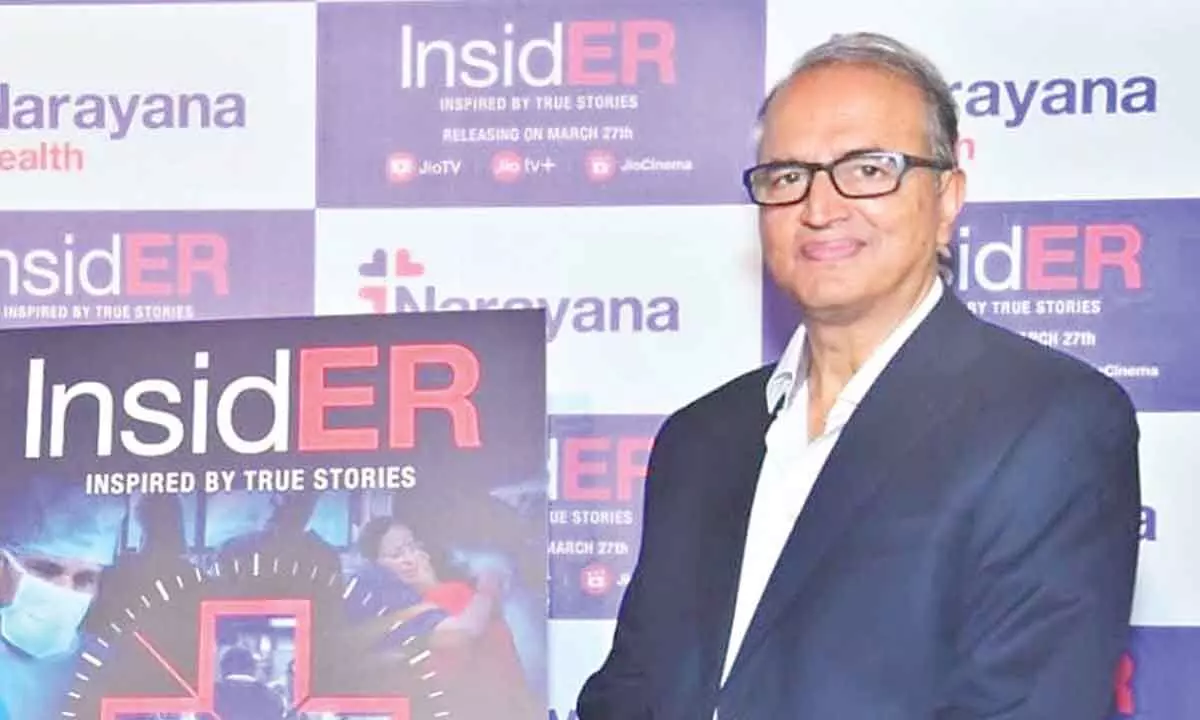Leveraging tech to improve emergency care: Devi Shetty
Series will highlight the importance of acting quickly during the golden hour, says Dr. Devi Shetty, Founder & Chairman of Narayana Health
image for illustrative purpose

Narayana Health, one of India's leading healthcare providers, has come up with a medical docu-series, ‘InsidER,’ which will premiere exclusively on Jio Cinema, Jio TV, and TV+ on March 27. Its objective is to spread awareness about emergency care. Bizz Buzz spoke to Dr. Devi Shetty, Founder & Chairman of Narayana Health, about the docu-series and more
What is InsidER about?
It is about bringing emergency care directly to viewers. These are real stories of struggle and resilience, and of course the unwavering dedication of our healthcare teams. This series will highlight the importance of acting quickly during the ‘golden hour’—that is, those crucial moments when rapid intervention can make all the difference.
What do we need today to improve emergency care?
Today, we are running modern healthcare with 21st century improvements but with 18th century processes. This has to change. Everything that we look at in healthcare, will [have to] change. What is important in emergency care is… time.
Let’s look at cardiac arrest. When cardiac arrest or heart attack happens, you have four to six hours of golden period. In that period, you need to rush the patient to not just a hospital but the right hospital. If you land in the wrong hospital, you have a problem because it will take at least one to two hours to figure out what is going on. And by the time you understand what is going on, it could be too late.
But if you rushed to the right hospital, most of the damage done to your heart muscles can be reversed. However, if you go after the golden period, you may spend millions of dollars, but still be unable to save a life.
The worst thing is a brain stroke. When a brain stroke happens at, say, 2 ‘O’clock at night, you may be slow to respond because brain stroke is painless. This is unlike a heart attack.
How do you define the right hospital?
It is the hospital where the experts have the infrastructure to diagnose. They have the expertise to reverse the damage. All these require a different mindset. Fortunately, today we have all the infrastructure expertise. We believe that emergency services, when executed properly by the right group of people, can make a massive difference, the difference between life and death.
What should people do in emergency situations?
If you have a heart patient, you should know where the nearest hospital with a cath lab is. If you are a patient, staying in one house with an earlier brain stroke, you are vulnerable to another brain stroke. You should know which neurology institute nearby is the best.
What is Narayana Health doing to make emergency care easier and more accessible?
We are in the process of augmenting our footprint. We have already launched Narayana Emergency Ambulance Response (NEAR). So, if you have one pan-India number, you can reach out to us, and wherever we will guide you to the nearest best place. We are leveraging technology to improve emergency care.
How are you leveraging technology?
Apart from NEAR, we have a very advanced application called Narayana Care, which is an app you can tap in the hour of need. We have the medical records of most of our patients. So, our doctors advise the patient and the family what to do. Then, on the way, the ambulance team is trained. These paramedics are trained for the purpose. It is a continuum of care.
What can common people do when they find someone in an emergency condition, say, hit by heart attack?
I urge people to learn CPR (cardiopulmonary resuscitation) and to become saviors. They should act swiftly during the golden hour.

